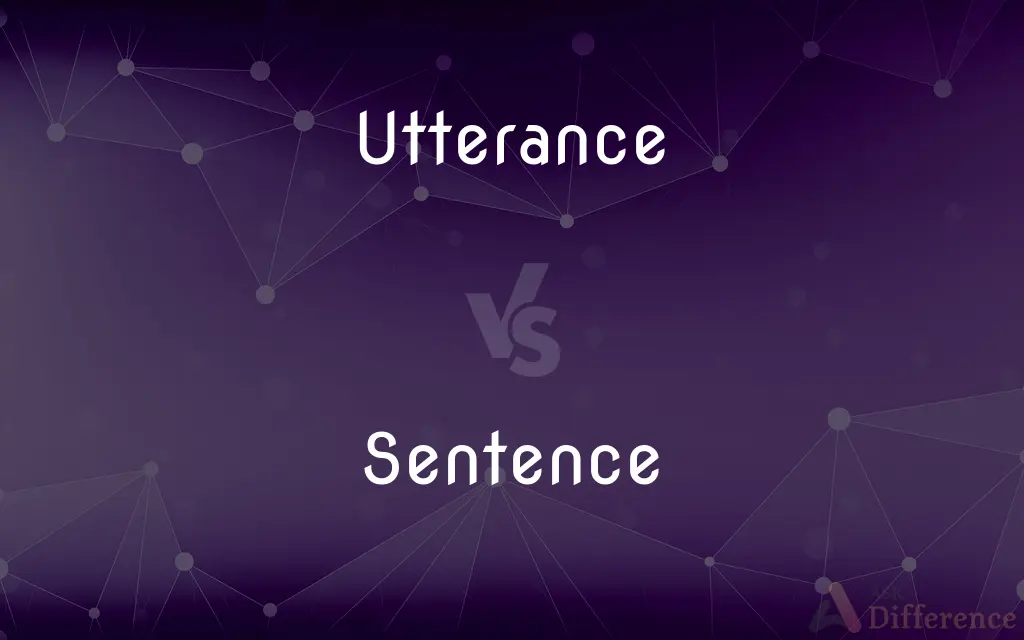Utterance vs. Sentence — What's the Difference?
By Tayyaba Rehman & Urooj Arif — Updated on May 16, 2024
Utterance refers to any spoken or written expression, often in context, while a sentence is a grammatically complete set of words conveying a statement, question, command, or exclamation.

Difference Between Utterance and Sentence
Table of Contents
ADVERTISEMENT
Key Differences
An utterance is any instance of spoken or written language used in a specific context. It can be a single word, a phrase, or a complete sentence. Utterances are context-dependent and may not always be grammatically complete. A sentence, on the other hand, is a grammatically complete set of words that expresses a complete thought. It follows specific syntactic rules and includes at least a subject and a predicate.
Utterances are used in communication and can vary greatly in length and formality. They capture how language is used in real-life situations. Sentences are more structured and are the building blocks of written and formal spoken language.
While an utterance can include multiple sentences or just a fragment of a sentence, a sentence is a defined linguistic unit that must be grammatically complete.
In conversation, utterances often reflect natural speech patterns and can include pauses, false starts, and incomplete thoughts. Sentences are typically more polished and used in writing or formal speech.
Utterances are analyzed in pragmatics, focusing on context and speaker intention. Sentences are analyzed in syntax and grammar, focusing on structure and correctness.
ADVERTISEMENT
Comparison Chart
Definition
Any spoken or written expression
A grammatically complete set of words
Structure
Can be incomplete or fragmentary
Must be grammatically complete
Context
Context-dependent
Independent of context
Analysis Field
Pragmatics
Syntax and grammar
Usage
Informal speech, conversations, real-life situations
Formal writing, structured speech
Compare with Definitions
Utterance
A segment of speech in conversation analysis.
The linguist analyzed each utterance for patterns.
Sentence
Follows grammatical rules, with a subject and predicate.
The cat slept on the mat is a simple sentence.
Utterance
Can include non-verbal sounds or pauses.
The utterance included several um and ah sounds.
Sentence
A set of words that is complete in itself, conveying a statement, question, command, or exclamation.
She wrote a long sentence describing her day.
Utterance
Any spoken word, phrase, or group of words.
His utterance was unclear due to the background noise.
Sentence
Ends with a period, question mark, or exclamation point.
Are you coming? is a question sentence.
Utterance
An instance of verbal expression in context.
Her utterance of Wow! showed her surprise.
Sentence
Forms the basic unit of written language.
The paragraph consisted of several well-structured sentences.
Utterance
In spoken language analysis, an utterance is the smallest unit of speech. It is a continuous piece of speech beginning and ending with a clear pause.
Sentence
A grammatical unit that is syntactically independent and has a subject that is expressed or, as in imperative sentences, understood and a predicate that contains at least one finite verb.
Utterance
The act of uttering; vocal expression.
Sentence
The penalty imposed by a law court or other authority upon someone found guilty of a crime or other offense.
Utterance
The power of speaking; speech
As long as I have utterance.
Sentence
(Archaic) A maxim.
Utterance
A manner of speaking
Argued with forceful utterance.
Sentence
(Obsolete) An opinion, especially one given formally after deliberation.
Utterance
Something uttered or expressed; a statement.
Sentence
To impose a sentence on (a criminal defendant found guilty, for example).
Utterance
The uttermost end or extremity; the bitter end.
Sentence
(dated) The decision or judgement of a jury or court; a verdict.
The court returned a sentence of guilt in the first charge, but innocence in the second.
Utterance
An act of uttering.
Sentence
The judicial order for a punishment to be imposed on a person convicted of a crime.
The judge declared a sentence of death by hanging for the infamous child rapist.
Utterance
Something spoken.
Sentence
A punishment imposed on a person convicted of a crime.
Utterance
The ability to speak.
Sentence
(obsolete) A saying, especially from a great person; a maxim, an apophthegm.
Utterance
A manner of speaking.
He has a good utterance.
Sentence
(grammar) A grammatically complete series of words consisting of a subject and predicate, even if one or the other is implied, and typically beginning with a capital letter and ending with a full stop or other punctuation.
The children were made to construct sentences consisting of nouns and verbs from the list on the chalkboard.
Utterance
(obsolete) A sale made by offering to the public.
Sentence
(logic) A formula with no free variables.
Utterance
(obsolete) An act of putting in circulation.
The utterance of false coin, or of forged notes
Sentence
(computing theory) Any of the set of strings that can be generated by a given formal grammar.
Utterance
The utmost extremity, especially of a fight; bodily harm or death.
Sentence
(obsolete) Sense; meaning; significance.
Utterance
The act of uttering.
Sentence
(obsolete) One's opinion; manner of thinking.
Utterance
Sale by offering to the public.
Sentence
A pronounced opinion or judgment on a given question.
Utterance
Power or style of speaking; as, a good utterance.
They . . . began to speak with other tongues, as the Spirit gave them utterance.
O, how unlikeTo that large utterance of the early gods!
Sentence
To declare a sentence on a convicted person; to condemn to punishment.
The judge sentenced the embezzler to ten years in prison, along with a hefty fine.
Utterance
Putting in circulation; as, the utterance of false coin, or of forged notes.
Sentence
To decree, announce, or pass as a sentence.
Utterance
Vocal expression; articulation; speech.
At length gave utterance to these words.
Sentence
(obsolete) To utter sententiously.
Utterance
The last extremity; the end; death; outrance.
Annibal forced those captives whom he had taken of our men to skirmish one against another to the utterance.
Sentence
Sense; meaning; significance.
Tales of best sentence and most solace.
The discourse itself, voluble enough, and full of sentence.
Utterance
The use of uttered sounds for auditory communication
Sentence
An opinion; a decision; a determination; a judgment, especially one of an unfavorable nature.
My sentence is for open war.
That by them [Luther's works] we may pass sentence upon his doctrines.
Utterance
Can be grammatically incomplete.
Going to the store? is an utterance lacking a clear subject.
Sentence
A philosophical or theological opinion; a dogma; as, Summary of the Sentences; Book of the Sentences.
Sentence
In civil and admiralty law, the judgment of a court pronounced in a cause; in criminal and ecclesiastical courts, a judgment passed on a criminal by a court or judge; condemnation pronounced by a judicial tribunal; doom. In common law, the term is exclusively used to denote the judgment in criminal cases.
Received the sentence of the law.
Sentence
A short saying, usually containing moral instruction; a maxim; an axiom; a saw.
Sentence
A combination of words which is complete as expressing a thought, and in writing is marked at the close by a period, or full point. See Proposition, 4.
He fills, he bounds, connects, and equals all.
A king . . . understanding dark sentences.
Sentence
To pass or pronounce judgment upon; to doom; to condemn to punishment; to prescribe the punishment of.
Nature herself is sentenced in your doom.
Sentence
To decree or announce as a sentence.
Sentence
To utter sententiously.
Sentence
A string of words satisfying the grammatical rules of a language;
He always spoke in grammatical sentences
Sentence
(criminal law) a final judgment of guilty in a criminal case and the punishment that is imposed;
The conviction came as no surprise
Sentence
The period of time a prisoner is imprisoned;
He served a prison term of 15 months
His sentence was 5 to 10 years
He is doing time in the county jail
Sentence
Pronounce a sentence on (somebody) in a court of law;
He was condemned to ten years in prison
Sentence
Can be simple, compound, complex, or compound-complex.
The sentence I tried to call you, but you were busy is compound.
Common Curiosities
What is an utterance?
An utterance is any instance of spoken or written expression, often context-dependent and not necessarily grammatically complete.
Can a sentence be an utterance?
Yes, a sentence can be an utterance when it is spoken or written in context.
What is a sentence?
A sentence is a grammatically complete set of words that expresses a complete thought.
What fields study sentences?
Sentences are studied in syntax and grammar.
How are utterances used in conversation analysis?
Utterances are analyzed to understand speaker intentions, context, and interaction patterns.
What makes an utterance different from a sentence?
An utterance can be any spoken or written expression in context, whereas a sentence is a grammatically complete unit.
What fields study utterances?
Utterances are studied in pragmatics and discourse analysis.
Are sentences always complete thoughts?
Yes, sentences must express complete thoughts and follow grammatical rules.
How are sentences used in writing?
Sentences form the basic units of writing, conveying clear and structured ideas.
Can an utterance be a sentence?
Yes, an utterance can be a sentence if it is grammatically complete and expresses a complete thought.
Are utterances always complete thoughts?
No, utterances can be fragments, single words, or incomplete thoughts.
Are sentences context-dependent?
Sentences are generally independent of context, focusing on grammatical completeness and clarity.
Can utterances include non-verbal elements?
Yes, utterances can include pauses, intonations, and non-verbal sounds.
Do sentences include non-verbal elements?
No, sentences are purely grammatical constructs without non-verbal elements.
Can an utterance be analyzed without context?
Utterances are often dependent on context for full understanding, making context crucial for analysis.
Share Your Discovery

Previous Comparison
Roller vs. Pulley
Next Comparison
Achieve vs. SucceedAuthor Spotlight
Written by
Tayyaba RehmanTayyaba Rehman is a distinguished writer, currently serving as a primary contributor to askdifference.com. As a researcher in semantics and etymology, Tayyaba's passion for the complexity of languages and their distinctions has found a perfect home on the platform. Tayyaba delves into the intricacies of language, distinguishing between commonly confused words and phrases, thereby providing clarity for readers worldwide.
Co-written by
Urooj ArifUrooj is a skilled content writer at Ask Difference, known for her exceptional ability to simplify complex topics into engaging and informative content. With a passion for research and a flair for clear, concise writing, she consistently delivers articles that resonate with our diverse audience.













































